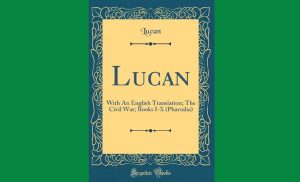Pharsalia | The Civil War | Lucan-A Review
Pharsalia or The Civil War by Lucan-A Review
“Pharsalia,” also known as “The Civil War,” is an epic poem written by the Roman poet Marcus Annaeus Lucanus, commonly referred to as Lucan. Composed during the 1st century AD, the poem focuses on the Roman Civil War between Julius Caesar and Pompey the Great, offering a unique perspective on the turmoil and political strife of the era. Lucan’s work is notable for its vivid and dramatic portrayal of historical events, philosophical explorations, and its distinctive style that sets it apart from other Roman epic poems.
Historical Context:
Lucan’s “Pharsalia” provides a lens through which readers can view the tumultuous times of the Roman Republic’s decline. The poem primarily centers around the power struggle between Julius Caesar and Pompey, leading up to the decisive battle of Pharsalus in 48 BC. Lucan’s portrayal of these events showcases the brutality, political intrigue, and moral conflicts that marked this period in Roman history.
Vivid Imagery and Grandeur:
One of the standout features of “Pharsalia” is Lucan’s skill in creating vivid and intense imagery. He describes battle scenes, landscapes, and characters with a sense of grandeur and detail that brings the narrative to life. The poem’s dramatic and often gruesome depictions contribute to its portrayal of the horrors of war and the destructive impact of unchecked ambition.
Philosophical and Moral Themes:
Beyond its historical narrative, “Pharsalia” delves into philosophical and moral discussions. Lucan explores themes such as the corruption of power, the limits of human ambition, and the conflict between personal desires and loyalty to the state. Through the characters’ inner struggles and dialogues, Lucan contemplates the ethical dilemmas faced by individuals caught in the midst of political turmoil.
Dramatic Style:
Lucan’s style sets “Pharsalia” apart from other epic poems of its time. Unlike the works of Virgil and Homer, Lucan’s poem is marked by its energetic and emotionally charged language. He employs rhetorical devices and intense imagery to evoke strong emotions in the reader, often using violent and shocking descriptions to emphasize the chaos and brutality of war.
Unfinished Nature:
One notable aspect of “Pharsalia” is that it remains unfinished. The poem consists of ten books, with the author’s intended scope likely extending further. The abrupt ending has sparked debates among scholars regarding Lucan’s intentions and the reasons behind the unfinished state of the work.
Influence and Reception:
Despite its unfinished nature, “Pharsalia” has had a significant impact on later literature. Its unique style and exploration of complex themes have earned it admiration from subsequent generations of poets and writers. Notable figures such as Dante Alighieri and Christopher Marlowe drew inspiration from Lucan’s work.
Criticisms:
While “Pharsalia” has garnered praise for its innovative style and thematic depth, it has also faced criticisms. Some critics have argued that Lucan’s excessive focus on violent imagery and rhetorical display at times detracts from the coherence of the narrative. Additionally, the abrupt ending and fragmented nature of the poem have led to debates about the overall effectiveness of the work.
In conclusion, Lucan’s “Pharsalia” stands as a unique and thought-provoking piece of Roman epic poetry. Its vivid imagery, philosophical explorations, and dramatic style contribute to its lasting impact on the literary landscape. The poem’s portrayal of historical events and its examination of moral dilemmas make it a compelling work that continues to capture the attention of readers and scholars alike. 0 0 0.
Pharsalia The Civil War Lucan-A Review
You May Like: Beowulf-A Review
N.B. The article originally belongs to the book entitled ‘The Reviews of Epic Literature Around the World Vol-II‘ by Menonim Menonimus.








